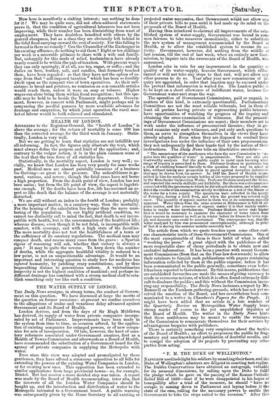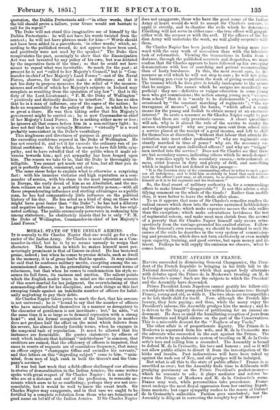"F. H. THE DUKE OF WELLINGTON."
IsLuveame used todelight his soldiersbv smackiagtheir faces, and the Duke of Wellington's admirers are diligent in courting tart replies. The Dublin Conservatives have obtained an autograph, valuable for its unusual dimensions, by calling upon the Duke to fulfil the pledge which he gave on the passing of the Raman Catholic Relief Bill of 1829—that if he were disappointed in his hopes of tranquillity after a trial of the measure, he should "have no scruple in coming down to Parliament and laying before it the state of the ease, calling for the necessary powers to enable the Government to take the steps suited to the occasion." After this quotation, the Dublin Protestants add—" in other words, that if the bill should: prove a failure, your Grace would net hesitate to call for its repeal." The Duke will not stand this imaginative use of himself by the Dublin Protestants : he will not have his words twisted from the context; he will not have phrases made for him—" Words should not have been added in a parenthesis, in other words,' which, according to the published record, do not appear to have been used, and positively were not used by the speaker." The Duke then recapitulates the past, seemingly to show that the Emancipation Act was not invented by any policy of his own, but wax dictated by the imperative facts of the time ; so that he could not have meant to repeal what was inevitable. So much for the past ; at present he is not "called to her Majesty's Council," but is "Commander-in-chief of her Majesty's Land Forces "—not of the Naval Forces, observe, for that might make a difference ; and it is not his duty to propose measures for the relief of "the inconveniences and evils of which her Majesty's subjects in Ireland may complain as resulting from the operation of any law " : that is the duty of the Lord-Lieutenant; "P. M. the Duke of Wellington" "positively and distinctly declines to interfere." He has no idea that he is a man of influence, one of the sages of the nation; he feels no responsibility for the policy of the past, in -which he bore so great a share. He was then taking order that his Majesty's government might be earned on ; he is now Commander-in-chief of her Majesty's Land Forces. He is nothing either more or less ; he ignores all that comes before him in a non-military light; he does not feel that he is virtually Minister : " virtually * is a word probably nonexistent in the Duke's vocabulary. This singleness and directness of purpose in great part explains the exceeding confidence reposed in the Duke of Wellington. He has not courted it, and yet it far exceeds the ordinary run of political confidence. On the whole, he seems to have felt little sympathy, and to have rebuffed that of the public when it made advances towards him ; and yet sympathy has been heaped upon him. The reason we take to be, that the Duke is thoroughly intelligible. You cannot get much out of him, but all that you do get is perfectly direct, consistent, and clear. The same cause helps to explain what is otherwise a surprising fact : with his immense victories and high reputation as a commander of armies, with his share in the most important councils in Europe, the early dread of him as an Absolutist, and the modern reliance en him as a perfectly trustworthy person,—with all these preponderatinginfluences and sterling advantages as &public man, he has had comparatively little influence on the political history. of his day. Ho has acted as a kind of drag on those who Might have gone faster than "the Duke " ; he has had a dilatory and negative influence; he has given little impulse, he has originated nothing. The public erroneously perseveres in reckoning him among statesmen ; he obstinately insists that he is only "F. M. the Duke of Wellington, Coroaraawler-in-ehief of her Majesty's Land Forces."



























 Previous page
Previous page